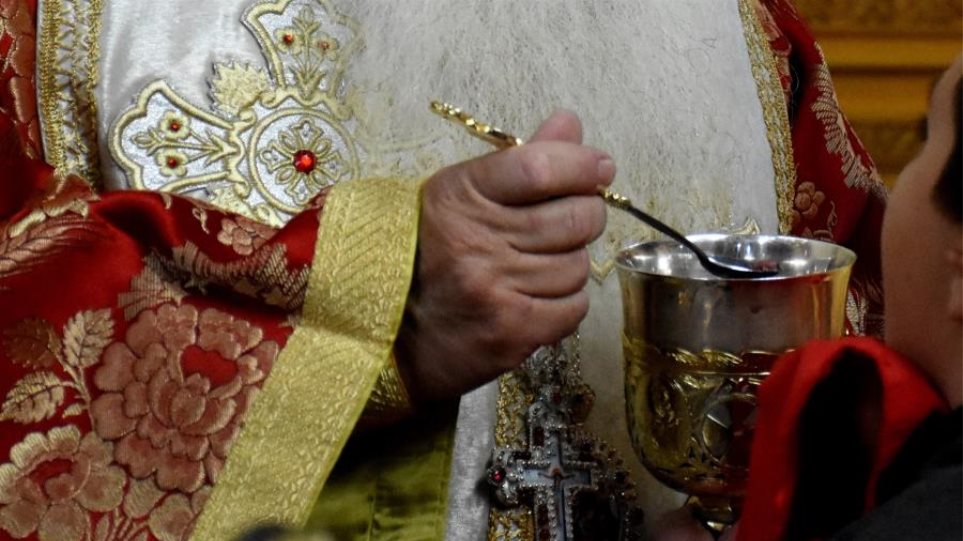
In the Parable of the royal wedding feast the Lord introduces among the guests someone who did not wear the appropriate clothing for the wedding of the king's son. When the king saw him, he considered his attitude insulting and ordered him to be taken out of the palace, into the dark, his hands and feet tied for his audacity (see Matt. 22:11-13). This parable was told by the Lord, mainly, to help His listeners understand that in the joy of the kingdom of God, persons will not be allowed to enter without the appropriate clothing of the soul, which we Christians must prepare while we live to claim the joy of the Royal Wedding in God's heavenly kingdom.
But this Parable could also be associated to here and now, as the Bridegroom of the Church, Christ, enters within every virgin soul, i.e. within every believer who unites with Him through the Mystery of the divine Eucharist.
When one hears of the punishment suffered by the wedding guest of the parable who did not wear a suitable garment for the wedding it is natural for one to worry. What is the appropriate spiritual "wedding garment" that I should wear when going to Church and partaking of the holy Body and Blood of Christ?
In our previous Sermons, that interpreted the Divine Liturgy, we heard about the inventation of the faithful to come and receive communion:
- In fear of the Lord. With ought to approach the gifts in deep reverence and divine fear, with which the Angels stand round the heavenly throne of God.
- In faith. Firmly in the faith that Jesus Christ is the Son of God, the "True God", as stated in the Creed. At the same time, we ought to believe that what I will receive is the Holy Body of Christ, crucified for our salvation and resurrected in glory. Also, together I will partake of the Precious Blood of Christ, shed on the Cross of Calvary, for the salvation of the world.
With love. With the love that Christ taught which has two directions. Firstly we love God, whom it is natural to love with all the powers of our souls since through divine Communion we will be united with Him. And secondly we love our brothers. The Apostle Paul advises us: "if it be possible, as much as lieth in you, live peaceably with all men" (Rom. 1:18). Hatred and urges of revenge and the like cannot have a place in the heart of the believer who wants to commune. A necessary condition is our compliance with the words of the Lord: "Therefore if thou bring thy gift to the altar, and there rememberest that thy brother hath ought against thee; Leave there thy gift before the altar, and go thy way; first be reconciled to thy brother, and then come and offer thy gift." (Matthew 5: 23-24). Sometimes it is necessary to postpone the Holy Communion so that you can first reconcile with your brother and then receive communion.
A problem arises here. As I dealt with the injustice I did towards the other person and asked for his forgiveness, but he does not want to forgive me, what should I do? To live without Holy Communion? In such a case we will present the matter to our Spiritual Father and follow his instructions.
Let us also remember that when the Celebrant raises the Holy Gifts in the Divine Liturgy, he pronounces the words: "The Holy Things to the Holy". And as our Fathers interpret it, with these words the Celebrant invites some to the divine Communion and prevents others - depending on the spiritual condition of each believer. Everyone needs to examine himself if his relationship with Christ is harmonious; that issues of distrust or unfaithfulness to God's will do not arise; that our body, which is the "temple of the Holy Spirit", have been kept pure from carnal sins, which stain body and soul. And generally we examine ourselves to see if we have committed serious sins that cut us off from God. When there are such obstacles how can the Holy God unite with a dirty soul and a dirty body?
That is why the Apostle Paul warns us: "But let a man examine himself, and so let him eat of that bread, and drink of that cup (i.e. the holy Body and Blood). For he that eateth and drinketh unworthily, eateth and drinketh damnation to himself, not discerning the Lord's body. For this cause many are weak and sickly among you, and many sleep." (1 Cor. 11: 28-30). Think about it! Because they partook unprepared, they got sick and some died. Let this fact make us very careful before we commune.
If in our spiritual self-examination that out conscience investigates our inner dimensions for transgressions of God's will, and with a spirit of repentance and humility we should seek the appropriate Spiritual Father (Confessor), to open our hearts to him and honestly, without excuses, confess all our sins. Then let us follow the instructions of the Spiritual Father, both in spiritual matters that concern us and in everything that has to do with our participation in the divine Communion. Depending on our spiritual condition, the Spiritual Father will appoint us whenever we need to commune. Let's not take it for granted, that anyone who attends church must also receive communion, without the very above preconditions that we mentioned. Only with proper preparation each time can we come to commune. Then comes the grace of the Holy Spirit and we are united with Christ and the holy purpose of the Holy Communion is fulfilled for our sanctification. Amen.





